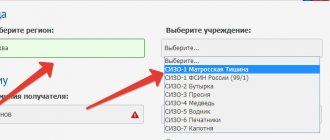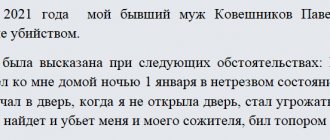We cannot ignore the issues related to pardon in the Criminal Code of the Russian Federation.
The institution of pardon in the Russian Federation has just entered the restoration phase.
Problems in the state have always left the pardon of prisoners on the sidelines, but the disabled, mothers of many children, pensioners, seriously ill people and pregnant women continue to be in prison.
“Do they deserve pardon?” - an individual question, “Pardon of criminals - what is it and how to achieve it?” – these and other questions are discussed in detail in this article.
General information
If any appeal does not help, then there is still hope - filing a petition with the country's guarantor. Legislation allows the president to unilaterally decide to release a citizen of the country from criminal punishment.
The pardon may be full or partial. However, by decision of the head of state, it is impossible to reverse the consequences of punishments already implemented. For example, a prisoner cannot be deprived of insignia or awards.
Motives for pardon and refusal
It is very important to understand what the actual motives for asking the president for a pardon will be to obtain forgiveness. They may be based on the following:
- serious services to the state;
- primary conviction;
- poor health of the person asking for pardon;
- intercession for the prisoner by the public or loved ones;
- advanced age;
- discovery of facts that were not taken into account when imposing punishment, considering the case, and so on.
Pardon will be unequivocally denied to a person who committed a crime while serving a suspended sentence. Applications from the following citizens will be rejected:
- if the applicant was previously subject to an amnesty;
- if a decision on pardon was previously made against the citizen;
- if mitigating measures have already been applied to the person.
Petitions from prisoners who have repeatedly violated law and order in prison will not be considered.
general information
Pardon has always been a very individual phenomenon. Pardon is an act issued by the head of state (i.e., the supreme representative of the government).
The content of a pardon may in one case free the convicted person from the punishment imposed by the court completely, and in another only partially.
If you look at history, you might be surprised where the origins of the right to pardon come from. Being one of the most ancient legal institutions, pardon was known to the subjects of King Hammurabi.
Medieval rulers also did not hesitate to apply such law in relation to their decisions.
The institution of pardon is approved by religion, which in those days had significant weight.
Based on feelings of mercy and forgiveness, orders are given and the convicted escape punishment.
This is how the principle of humanity was laid down and human rights and freedoms began to be respected in the penal law of the Middle Ages.
Law
The legislative framework of the Russian Federation is huge and includes many laws and regulations.
If we talk about pardon taking into account the hierarchy of legal acts, then the fundamental provisions are contained in the Constitution of the Russian Federation, the Criminal Executive Code of the Russian Federation and Article 85 of the Criminal Code of the Russian Federation.
All these acts cover the entire range of provisions on pardon and are specified from the point of view of the legislator.
In addition to these legal blocks, there are Decrees of the President of the Russian Federation concerning issues of pardon.
In order to correctly understand the essence of pardon in Russia, it is necessary to familiarize yourself with the basic provisions about it.
Thus, the Constitution of the Russian Federation says that the highest value is the rights and freedoms of man and citizen.
In addition, every convicted person has every right to apply for a pardon or change the sentence towards mitigation.
Also, the Constitution states that the President of the Russian Federation has the right to pardon convicts.
And although there are many gaps in the pardon legislation, in recent years, as statistics indicate, prisoners are increasingly beginning to resort to such a right.
Right
Every person who has been convicted by a court can apply for a mitigation or cancellation of a sentence.
And despite speculation, the existence of such a right in no way depends on the crime of what gravity was committed.
The ability to ask for pardon has nothing to do with the personality of the convicted person.
Both exemplary prisoners and desperate rebels are equal in these rights.
So on what basis are convicts given such a right?
As a rule, a prerequisite for pardon is one or another fact that cannot attract attention.
For example, if the prisoner spent most of the assigned term outside his will and has now completely changed himself and changed his attitude towards life.
In such cases, pardon is permitted.
Who has it?
The right to pardon is granted to citizens of the Russian Federation, stateless persons, as well as foreigners who may be serving a sentence for a particular crime in Russia.
The legislation of the Russian Federation nowhere makes a framework regarding who can apply for a pardon.
Once again, it must be repeated that each case is particularly individual and requires detailed consideration.
Who has the right to appeal to the head of state
Any citizen has the right to submit a petition for pardon to the President of Russia. Even those sentenced to life imprisonment or those given a long period of detention are not deprived of this right.
The decision by the head of state is made individually. All facts that may influence the decision are considered.
Difference from amnesty
The two concepts - “amnesty” and “pardon” - have a number of distinctive features. The amnesty applies to persons who are selected based on general classification criteria. The decision to pardon is made exclusively in relation to a specific individual, that is, it is subjective.
The amnesty applies not only to persons against whom criminal proceedings have already been completed and a court decision has been made, but also to those against whom an investigation is still underway. Pardon is allowed only in cases where a court decision has already been made against the person.
After the request for pardon is granted, an act is issued, which is the basis for release from prison. If a person falls under the amnesty, then additional decisions and decisions are made and a certain procedural procedure is carried out.
Typology of pardons
In 2022, pardons can be classified based on their consequences:
- the applicant was released from prison and his sentence was terminated;
- the period of stay in places of detention has been reduced for the convicted person;
- the perpetrator was given a more lenient form of punishment;
- the period of criminal record previously served has been removed.
Another version of the typology is determined by the identity of the submitter of the request for clemency. According to this typology, the following options are distinguished:
- mother's petition;
- Act of the President;
- petition from society;
- petition of the convicted person himself.
The petition coming from the mother is a cry of despair. The desire of a mother to protect her son/daughter from punishment, regardless of the severity of the act committed, is very common. The commissions preferred to accept the application of the mother of the person who violated the law as priority. Experts advise accompanying your own petition for pardon addressed to the President with a letter from your mother. However, recently the effectiveness of the mother’s petition has been gradually decreasing. However, it is better to draft a letter from the mother to enhance the impact of the clemency petition. You can ask a lawyer for a sample document or find it online. If the mother has health problems, certificates about this are attached to her application.
Read also: Drawing up an application to involve a co-defendant in a civil case
A presidential decision to pardon may apply to any person who has been sentenced to punishment. The absence of representations to the President from administrative commissions cannot become an obstacle to forgiveness. As a general rule, a petition is still necessary, as well as a presentation with a conclusion whether to grant the petition or not.
According to practice, petitions are submitted on behalf of the convicted person or his human rights defender. But there are situations when a petition is drawn up from the public. A person who has committed a crime is accepted by the public as innocent, for example, when committing murder in self-defense. In this case, a personal petition is accompanied by a petition from society, i.e. groups of people.
Classification
Depending on the consequences, the following types of pardons are distinguished:
- with a reduction in the length of the sentence;
- complete release from isolation;
- changing the punishment to a less severe one;
- forgetting a criminal record.
Depending on the initiator of the petition, there are four types:
- Presidential. Submitted on behalf of officials of administrative and territorial units.
- Maternal petition for clemency. This type of appeal is most often made in practice. After all, any mother, regardless of the degree of guilt, loves and will protect her child. Such appeals are submitted to the Presidential Pardon Commission and are always given priority over other types of petitions. It is precisely on such requests that positive decisions are most often made.
- Personal.
- Public.
Statistics and case studies
Before the institution of a pardon commission was implemented in 2001, decisions on forgiveness were made in the thousands every year; for example, in 2000, their number was 8,650. The introduction of the existing system of gradual screening of applications made it possible to significantly reduce the number of those released under the act of pardon, among whom were previously repeat offenders. and persons who have committed crimes characterized by particularly serious consequences.
In recent years, the number of pardons has been sporadic; for example, in 2014, only 4 corresponding Acts were issued.
The following video will tell you about pardons in other countries:
Review procedure
Naturally, the President of Russia cannot consider all requests and delve into every situation. Therefore, until a document reaches his desk, it goes through a number of authorities.
First of all, the petition for pardon goes to the head of the institution where the applicant is serving his sentence. Then the application is transferred to the criminal-executive inspection, which supervises the specific correctional institution. After this, the petition is considered by a special commission, which forms its opinion on the received document on the possibility of making a decision on pardon. Such a commission is created at the local level and must consist of persons who have an impeccable reputation.
Only after this does the request go to the presidential administration, and then to the guarantor himself.
Terms of consideration and procedure for release
- To release a convicted person, nothing more is required besides a pardon. After a pardon has been issued, it is sent to:
- personally convicted;
- to the Inspectorate for the Execution of Criminal Sentences;
- to a correctional institution;
- to the local administration.
- The convicted person must personally apply to the authorities for a pardon, since petitions from close relatives will not be considered due to the lack of a request from the convicted person.
- After the President has rejected the petition, he will consider the subsequent one no earlier than a year later, but if any important circumstances arise, the petition can be resubmitted.
Find out how to apply for a state fee offset.
Read the article about the procedure for bringing a third party to court.
A sample petition to apply the statute of limitations can be downloaded here.
How to make a petition?
How to write a petition for clemency to the president? The document can be drawn up by hand and in free form.
A sample document structure looks like this:
- in the upper right corner the details of the recipient and the applicant are written down;
- Title of the document;
- a brief description of the situation in which the applicant was convicted, under which article of the Criminal Code and where he is serving his sentence, term;
- the essence of the requests and reasons that provide grounds for pardon;
- an indication of sincere repentance;
- if there is a positive characteristic from places of deprivation of liberty, then this should be mentioned.
At the end of the text, the date of compilation is indicated, a signature and full name are placed. You can list any facts that can really contribute to a positive resolution of the petition.
Applications
The documents that will be attached to the application are prepared by the administration of the place where the convicted person is serving his sentence.
This package includes the following documents:
- information about whether the material damage to the injured party is compensated;
- information about other periods of serving in the colony, whether an amnesty was previously applied to the applicant and whether there were decisions on parole;
- information about whether a petition for pardon was previously submitted, and if so, what was the result after its consideration;
- medical certificates from relatives of the convicted person, if the text of the document contains a reference to their poor health;
- characteristics of the convicted person;
- medical report on the condition of the convicted person;
- brief information about the crime committed and the court sentence;
- statement of the injured party for forgiveness of the convicted person (if any);
- personal details of the applicant.
And the last document that must be attached to the petition is a proposal from the colony leadership for a pardon.
The entire procedure for collecting and processing documents is given to the colony administration from 10 to 20 days. This date is counted from the moment the petition was filed and registered.
Reasons for filing
Every convicted person, as well as his relatives, has the right to file a petition for pardon. Even if a lifelong charge or a long prison sentence was brought.
The application may be rejected, often this happens to persons who:
- have ever received an approved pardon;
- committed a crime while on probation for a criminal offense;
- while being held in a correctional institution, they violated discipline;
- were released from prison on parole;
- received an amnesty previously;
- received a mitigation of retaliation.
According to the Constitution of the Russian Federation, certain categories of persons have the right to apply for a pardon:
- if the criminal punishment was imposed by a judicial authority of the Russian Federation, and the convicted person is serving it on the territory of the Russian Federation;
- the conviction was brought by a court of a foreign state, and the accused is serving his sentence in Russia;
- The convict served his sentence, but his criminal record was not cleared.
Sample petition to the President for pardon on behalf of the mother
To the President of the Russian Federation
Putin V.V.
from (full name), living at the address...
year of birth…
Petition for pardon.
(Date) the court ... convicted my son - full name, ... year of birth, for ... under article ... And sentenced to ... years in prison. At the moment, my son has been away for... years... months.
I ask you to have mercy on my son... Full name for the following reasons:
- he has been brought to criminal responsibility for the first time and has not previously been found guilty of reprehensible behavior;
- the convicted person writes in his letters that he is fully aware of his guilt and repents;
- at the time of the crime, my son was intoxicated;
- I myself am very sick and need care, I am a group 1 disabled person, I recently suffered a heart attack;
- Apart from my son (full name), I have no other children or relatives, so there is no one to look after me;
- while serving his sentence, my son fell ill with tuberculosis and needs surgery;
- other grounds are prescribed that may influence a positive decision.
Based on the above, I ask you to pardon my son and release him from further serving his sentence.
Date of compilation, signature, mother’s full name.
What does pardon mean?
According to part 3 of Art. 50 of the Constitution of the Russian Federation, every convicted Russian has the right to ask for pardon, which means an improvement in the situation of the person in respect of whom there is a sentence that has entered into force. Only those who have been sentenced and must serve it can apply for such leniency; this is different from amnesty.
Due to the issuance of an amnesty act for any holiday, memorable date, etc. a person may be released from serving a sentence, which will be indicated in the sentence. A similar situation when a person is found guilty, but is released from punishment, may be the expiration of the statute of limitations for bringing to justice. Under such circumstances, when there is a verdict but no punishment, pardon is impossible.
In accordance with the Constitution of the Russian Federation and criminal law, a person has the right to apply for pardon in any criminal case, be it theft or brutal murder with qualifying characteristics, regardless of the type and duration of the imposed punishment. What can you ask for? According to the legislation, a person has the right to make the following request:
- release completely from further serving of the sentence. Example: Churov E.N. assigned to serve 5 years in prison, 2 of which he served. Having addressed the President of the Russian Federation with a petition, Churov was pardoned and released from serving the remaining 3 years of isolation.
- mitigate the punishment by replacing it completely (or the unserved part) with a more lenient one - correctional labor, compulsory labor, restriction of freedom, a fine. Example: Eremin K.A. was convicted of intentionally causing bodily harm to his work partner, and was sentenced to 8 years in prison. Of these, Eremin has already served 7 years in a colony, and the remaining year was replaced by an act of pardon for 1 year of correctional labor.
- shorten the period of stay in a colony without changing the sentence of imprisonment to another. Example: when a convicted person was sentenced to 10 years in prison, but then, through a petition, it was possible to obtain leniency, reduce this term to 8 and a half years.
In addition to the above, you can apply for early expungement of a criminal record if a person has already served his sentence.
According to the law, for a certain time (depending on the category of the crime), a convicted person who has already served his sentence retains a criminal record - you can read more here. In this publication, we described in detail how to petition the court for early expungement of a criminal record. Meanwhile, each person has the opportunity to draw up a petition of similar content, sending it not to the court, but to the President. Example .
Lavrentiev P.A. served his sentence of imprisonment and was released from a correctional facility. Lavrentyev was convicted of robbery, which meant 8 years of expungement from the specified date. Not wanting to wait until the expiration date for his criminal record expired, Lavrentyev applied to the court for early expungement of his criminal record, but was denied. Later, Lavrentyev decided to write to the head of state, his request was granted, and his criminal record was cleared ahead of schedule. Since asking for a pardon is the constitutional right of any Russian, it is impossible to prevent the implementation of this opportunity under any circumstances. For example, the administration of the institution where the convicted person is serving his sentence does not have the right to refuse to register a petition received from the convicted person.
According to the laws of Russia, pardon can only be granted by the President of the Russian Federation, and no one else. Even on his instructions, or on his behalf, no official has the right to show constitutional mercy to the convicted person. Unlike the act of amnesty, which extends its effect to a group of people who share certain characteristics (disabled people, women, minors, suspended sentences, etc.), the act of pardon applies only to one specific person individually.
The procedure occurs in the following order:
- Drawing up a written request.
- Sending it for consideration.
- Getting the result.
Let's consider the listed stages in more detail.
Peculiarities
How to write a petition for clemency and receive it? In fact, despite the fact that such petitions are filed quite often, positive decisions are made very rarely. In fact, although the president makes a discretionary decision, the petition is actually considered by the pardon commission, which is formed in each administrative-territorial entity. It is the members of this commission who make a decision and make recommendations on pardon or rejection of the petition.
But despite all this, you should always hope for the best. Moreover, mitigation of punishment is possible in relation to any guilty person; even those sentenced to life imprisonment and with the longest possible term have the right to apply.










